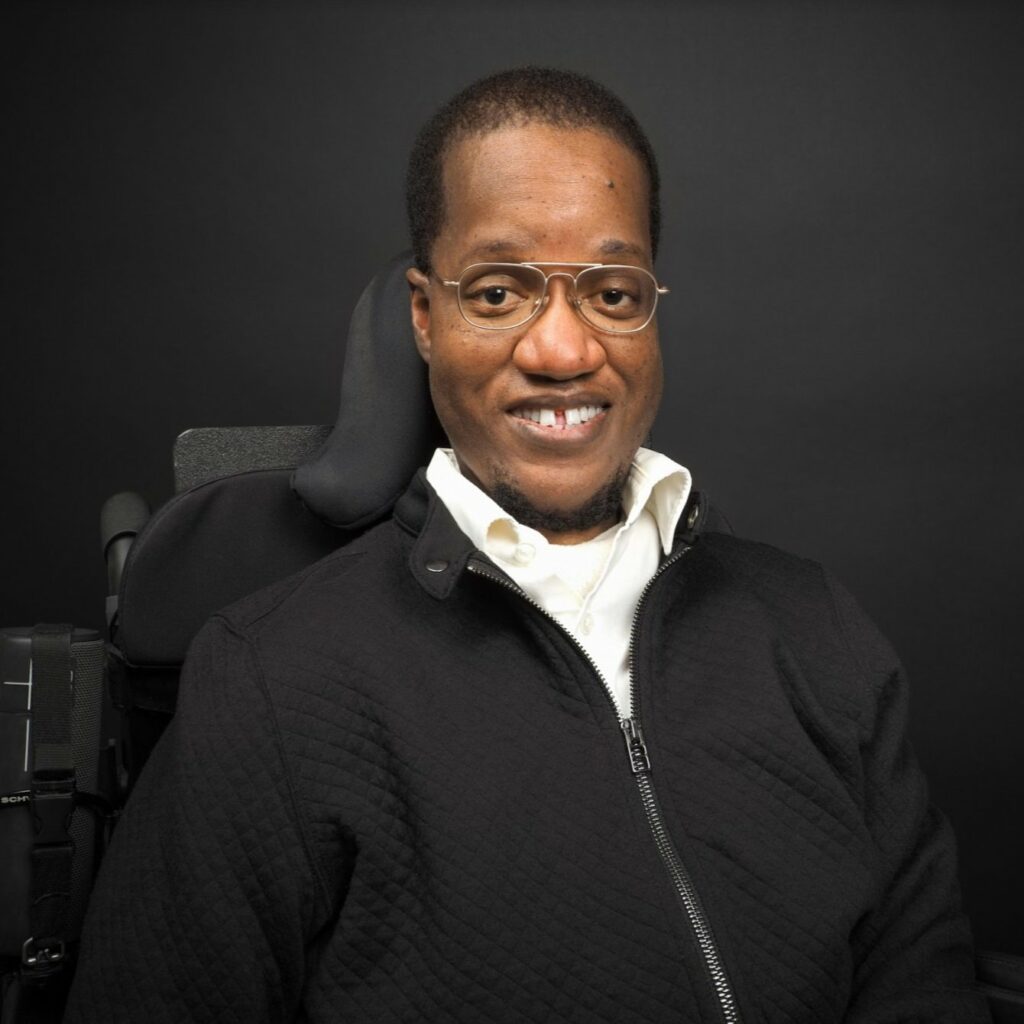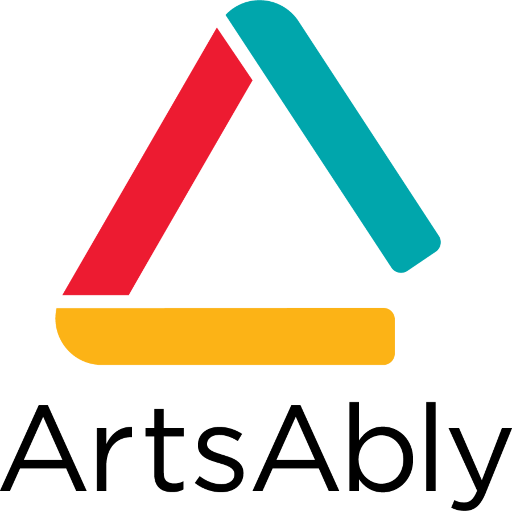As part of the podcast series, “ArtsAbly in Conversation,” Diane Kolin interviewed Gift Tshuma, a disability rights activist and a musician, a singer-songwriter, and a producer focusing on emerging music technology development and collaborative practice.

This post presents the resources that he mentioned during the conversation.
Gift Tshuma
Gift Tshuma doesn’t self-identify as your ordinary R&B Gospel singer. Gift is the co- founder and leader of his ensemble: United Tribulation Choir, which he founded and led for fourteen years in Montreal. He is a strong supporter of diversity, and he extends his reach by singing in multiple languages and performing in a broad array of styles including beatboxing and live looping. Gift carries with him more than fifteen years of experience as a profession artist, in addition to his academic background in music. He has trained in classical and jazz vocals, and was mentored by Oliver Jones: a Montreal-based jazz pianist who was in turn trained by Oscar Peterson. As a disability rights advocate and co-founding member of a grassroots group, Accessibilize Montreal. He has worked on numerous initiatives targeting discriminatory infrastructure, that stigmatises and excludes people with diverse bodies and minds from public spaces.
Visit Gift Tshuma’s page on Blurring the Boundaries
Oliver Jones
Oliver Theophilus Jones is a pianist, organist, composer, arranger (born 11 September 1934 in Montreal, QC). A musical prodigy, Oliver Jones is one of the best-known and most talented Canadian jazz pianists of all time. He studied piano in his youth with Daisy Peterson Sweeney, sister of Oscar Peterson, and spent much of his career working in pop and variety settings. Jones drew critical notice for his technical dexterity and rollicking swing, often eliciting comparisons to Peterson. He received Félix Awards in 1989, 1994, 2007 and 2008, and Juno Awards in 1986 and 2009. An Officer of the Order of Canada and a Knight of the Ordre national du Québec, he was inducted into the Canadian Music Hall of Fame in 2023.
Visit Oliver Jones’ page on The Canadian Encyclopedia
John Kelly
John Kelly is a warm, funny, passionate musician with over 30 years’ live experience. He is a lover and a (non-violent) fighter for equality, inclusion and human rights. His songwriting sits alongside that of his heroes and peers; containing all the compassion and conviction of Woody Guthrie, the fiery passion of Billy Bragg and the imaginative storytelling of Ian Dury and The Blockheads. John has fired up crowds at venues ranging from protests and South London pubs to the Paralympic opening ceremony, where he played alongside Orbital and Sir Ian McKellen. He has also starred onstage and on screen in the likes of Graeae Theatre Company’s ‘Reasons to be Cheerful’ and this year’s BBC drama ‘Then Barbara Met Alan’. John Kelly released his debut album Better Late Than Never on 9 September 2022.
The Kellycaster
For a musician who is self-described as ‘a bit of a punk at heart’, the guitar is a pretty important instrument. The Kellycaster is a new type of guitar, built bespoke to Disabled musician John Kelly’s access needs and musical ambitions. The Kellycaster has an adapted body shape with a short neck which allows John to strum the strings of the guitar in the traditional way, whilst selecting chords using a keyboard with his left hand. This makes the full range of chords accessible and also maintains the full expressiveness of the guitar. The code and electronics for the Kellycaster were developed by Charles Matthews, in collaboration with John.
Know more about the Kellycaster on Drake Music
Charles Matthews
Charles Matthews is a musician and creative technologist with a focus on access. As an artist, he primarily works with combined light and vibrations (see for example: Light Recorders, Augmented Gamelan, and Jo-Anne Cox’s Defiant Journey). Charles has worked closely with UK-based organisation Drake Music for several years, developing, amongst other things: a custom guitar with musician John Kelly called the Kellycaster, an outdoor installation featuring digital instruments with a variety of sensors, Planted Symphony, and a musical Lazy Susan, designed to encourage turn taking in classrooms. Charles is currently developing the Haptic Baton with Human Instruments, and has created an open source framework called instrumentmaker.org, which forms the basis of workshops in collaboration with Montreal-based musician Gift Tshuma through their project Blurring the Boundaries.
Visit Charles Matthews’ page on Sync Leadership
David Bobier
David Bobier is a self-identified hard of hearing media artist with a mental health diagnosis and is the parent of two deaf children, now adults. His work has been exhibited internationally and has been the focus of prominent touring exhibitions in Ontario and the Atlantic provinces. Bobier has partnered with Inclusive Media and Design Centre at Ryerson University, Toronto and Tactile Audio Displays Inc. in researching and employing vibrotactile technology as a creative medium. As an extension of this research Bobier has established and is Director of VibraFusionLab in London, Ontario, Canada. The Lab emphasizes a holistic approach to considering vibration as a language of creation and exploration and to investigating broader and more inclusive applications of the sensory interpretation and emotionality of sound and vibration in art making practices. Through VibraFusionLab and in his own art practice Bobier aims at creating opportunities of greater accessibility in art making, art appreciation and in viewer experiences of art practices and presentations. Using performance and interactive installation Bobier explores the bridging of methods of communication and language and ways of interpreting or transforming one modality to another. His work is engaged in a multi-sensory approach and experimentation that allows for the transitioning and re-interpreting of content and experience from one medium to another with particular emphasis on the tactile as a form of creative expression.
Visit David Bober’s page on VibraFusionLab
Drake Music
Drake Music is a national arts charity working across the UK with our Head Office in London. They are a National Portfolio Organisation for Arts Council England and are also funded through Youth Music. They have been pioneering the use of accessible music technology for over 20 years. This enables more people to make music. In that time, they have developed lots of imaginative methods of teaching, learning, writing and playing music. They are specialists in using technology to break down disabling barriers to making music. Central to their work is the belief that everyone can fulfil their creative and musical potential, given the right opportunities. They are a Disabled-led organisation and work with Disabled people of all ages, from school children having their first instrumental lessons to professional Disabled musicians. They work where music, disability and technology meet. Their artistic development programme supports Disabled musicians to progress their work and they offer training and consultancy for teachers, music hubs and other organisations.
CAMIN (Canadian Accessible Musical Instruments Network)
The Canadian Accessible Musical Instruments Network (CAMIN) brings together music, education, technology, and disability scholars from four Canadian universities in Toronto, Calgary, and Vancouver, to work alongside Blurring the Boundaries Arts, a Montreal-based not-for-profit organization that specializes in accessible musical instrument design. CAMIN is made up of both nondisabled people and people with disabilities, and is guided by a disability-led model. The partnership is grounded in disability identity, culture, and pride. Instead of trying to adapt people to the ableist social and physical infrastructures of music, we begin with disability perspectives to guide music-making practices. CAMIN is positioned to make instruments and music making accessible across Canada and works towards this by distributing the teams respective experiences and expertise across the network.
RE/Lab (The Responsive Ecologies Lab)
The Responsive Ecologies Lab (RE/Lab) is a unique transdisciplinary collaborative research facility at Toronto Metropolitan University (formerly Ryerson University) run by directors Professors Ali Mazalek and Jason nolan. Its mission is to investigate social, cultural, educational, and design factors surrounding the emergent ‘Internet of Things’ (the interconnected technologies that surround us every day) and create novel tools and interfaces to ensure that technologies become a more meaningful and useful part of our lives. RE/Lab is dedicated to developing solutions to environmental, health, and social challenges, improving our safety and wellbeing, and our sense of connectedness to other Canadians, and creating innovative economic opportunities. RE/Lab’s engineering, architecture, design, digital media, education, and health sciences faculty work to bring environmental, social, health, economic, and educational benefits to Canadians, through projects in game-based learning, scientific discovery, the built environment, Adaptive Design, sensory technologies to improve quality of life for people with special needs, and technologies for personal health monitoring, social communication, and mobility, in collaboration with industry and niche business (Phantom Compass, Emig Acoustics, System80). The 5 year project will train over 200 undergraduate, graduate, doctoral, and post-doctoral researchers, commercialize research and innovation, and nurture social innovation.
Stevie Wonder
Stevland Hardaway Morris (born May 13, 1950), known professionally as Stevie Wonder, is an American singer-songwriter, musician, and record producer. One of the most acclaimed and influential musicians of the 20th century, he is credited as a pioneer and influence by musicians across a range of genres that include R&B, pop, soul, gospel, funk, and jazz. A virtual one-man band, Wonder’s use of synthesizers and other electronic musical instruments during the 1970s reshaped the conventions of contemporary R&B. He also helped drive such genres into the album era, crafting his LPs as cohesive and consistent, in addition to socially conscious statements with complex compositions. Blind since shortly after his birth, Wonder was a child prodigy who signed with Motown’s Tamla label at the age of 11, where he was given the professional name Little Stevie Wonder. Wonder’s single “Fingertips” was a No. 1 hit on the Billboard Hot 100 in 1963, at the age of 13, making him the youngest solo artist ever to top the chart.

